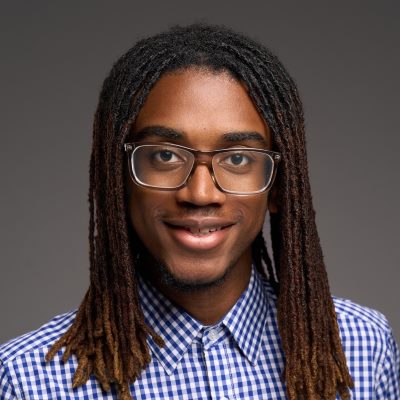Fall 2025 Winner of the Fight Against Domestic Violence Scholarship
Caleb Bryce Johnson
Caleb’s long-term goal is to be able to use data and technology to create digital solutions for domestic violence victims. To achieve this goal, he is currently majoring in Informatics with a focus in Human-Centered Data Science. Congratulations, Caleb, we look forward to the positive impacts of your work!

Read his essay
I remember hiding under my bed as a child, listening to yelling fill the house and the sound of things breaking. My little sister clutched my hand, trembling, and I tried to be strong even though I felt frozen. That was home. I learned that survival sometimes meant holding on quietly and pretending the world was normal. I learned that hope can exist even when everything around you feels unsafe. That hope stayed with me and made me want to do something not just for myself but for anyone living in fear.
Domestic violence is not just physical. It is tension in the air, fear in the silence, and wounds that do not show. Millions of families in the United States experience it. Kids like me learn patterns, learn to hide, learn to protect others, and sometimes forget what it feels like to feel safe. School can feel impossible. Friends can feel distant. Life can feel like you are holding a fragile object that might shatter at any moment. The trauma lingers. It affects relationships, mental health, and the way survivors see themselves in the world.
I began turning my experiences into action by volunteering at local shelters. I met survivors of all ages and backgrounds. They shared stories of fear, heartbreak, and courage. Some were simple. I helped a family move to a safe apartment. I sat with a child while they drew pictures of their family. I listened to a woman who had lost everything but still laughed at a memory she loved. The strength of these people was quiet but undeniable. Every small act I could offer, whether guiding paperwork, helping families connect with resources, or simply listening, felt meaningful. Those moments reminded me that change often starts small, one conversation, one connection at a time.
Education is a key tool in addressing domestic violence. Communities and schools can teach people to recognize warning signs, to support survivors, and to respond with empathy. Kids need to learn that their feelings matter, that they are allowed to feel safe, and that help exists. Awareness and understanding are tools that prevent abuse before it starts. Volunteering showed me that even small lessons, like listening or noticing fear in a child, can make an enormous difference.
Technology can create new ways for survivors to get help. Apps that let survivors reach out safely, online counseling that provides support without risk, and websites with clear information make help accessible. Technology cannot replace human care, but it can make it possible for survivors to get help quickly and quietly. Seeing survivors use these tools reinforced that combining practical solutions with emotional support can make life safer and more manageable.
Humor is part of survival, too. I have sat with survivors who told me stories so absurd and painful that we laughed quietly through tears. Humor does not erase trauma, but it allows people to breathe and remember that life exists outside fear. I have seen it help someone gather enough courage to make a difficult phone call or take a step they had avoided for months. Those moments taught me that supporting survivors is not only about resources but about connection, humanity, and presence.
Receiving the Fight Against Domestic Violence Scholarship would allow me to turn these experiences into long-term action. I plan to study Informatics with a concentration in Human-Centered Data Science. I want to design programs and digital tools that provide immediate support, connect survivors to resources safely, and help families rebuild their lives. I want children and families living with fear to know someone is on their side and that technology can make a difference. I want to help survivors reclaim their lives, their confidence, and their choices. I want to create systems where safety, learning, and support are accessible to everyone, and where data and technology are used to protect and empower those affected by domestic violence.
Every small act matters. Awareness, advocacy, and support can transform lives. Communities working together can turn fear into safety, silence into voice, and pain into purpose. Teaching children to recognize danger, holding someone’s hand through paperwork, or connecting survivors with resources might feel minor, but it can create life-changing outcomes. Those small steps add up. Every story, every spark of hope, every gesture counts.
My life has shaped me to notice abuse, act with care, and stand for those who cannot. The lessons I have learned from personal experience and from working with survivors fuel my commitment. I want to combine my understanding with professional skills to prevent abuse, advocate for families, and help survivors rebuild. I want to transform fear into hope and silence into power. Every choice I make now is guided by the belief that survivors deserve safety, dignity, and support.
Domestic violence leaves deep marks, but people’s actions create hope. Scholarships like the Fight Against Domestic Violence Scholarship are more than financial support. They allow students like me to learn, grow, and apply skills to help others. They make it possible to turn personal experience into advocacy, and advocacy into real change. I want to help build a world where children feel safe, families are supported, and survivors know they are not alone. Every story matters, and every action matters. That is the kind of world I want to help make real.









